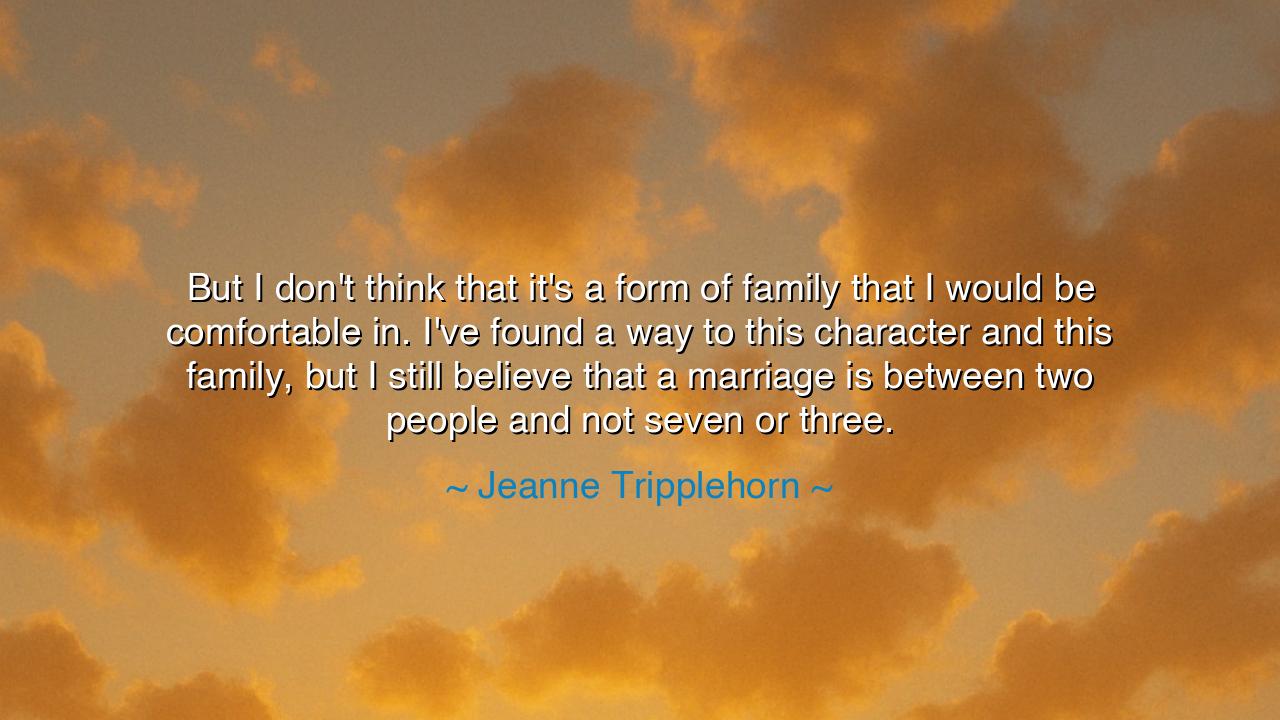
But I don't think that it's a form of family that I would be
But I don't think that it's a form of family that I would be comfortable in. I've found a way to this character and this family, but I still believe that a marriage is between two people and not seven or three.






In the grand narrative of human connection, the union of two individuals in marriage has always been regarded as one of the most sacred and profound bonds. Jeanne Tripplehorn, in her thoughtful words, expresses a personal reflection on family and the nature of marriage: “But I don’t think that it’s a form of family that I would be comfortable in. I’ve found a way to this character and this family, but I still believe that a marriage is between two people and not seven or three.” Her statement touches upon a deep, universal truth—that marriage, at its core, is a union between two individuals, not an amalgamation of many. She expresses not just a personal preference, but a reflection on the very nature of the marital bond itself.
The ancients were no strangers to the concept of marriage as a union between two souls. In Greek mythology, the story of Orpheus and Eurydice illustrates this powerful connection. Orpheus, the great musician, sought to bring his beloved wife, Eurydice, back from the underworld. His love for her was so profound that he was willing to risk everything for their union. Yet, despite his sacrifice, his belief that love between two people could overcome all obstacles was tragically tested. When he turned to look at her, breaking the one rule set by the gods, he lost her forever. This myth teaches us that the bond of marriage is sacred, fragile, and meant to exist between two, with deep emotional commitment to one another. It is a union that transcends all others, grounded in a shared connection, not merely in numbers.
In Tripplehorn’s reflection, she acknowledges that while the idea of family has evolved, and different forms of union have emerged, the core of marriage remains unchanged—two people, connected deeply, are the foundation of this institution. Her words stand as a counterpoint to the modern experimentations with familial structures, where polyamory or extended familial bonds are sometimes seen as alternative forms of connection. Yet, Tripplehorn’s words remind us that the simplicity and purity of marriage between two souls, bound by a shared love and commitment, has always been the ideal—a concept that has been cherished across generations.
Consider, if you will, the example of Hera and Zeus, the queen and king of the gods in Greek mythology. Their marriage, though fraught with challenges and conflicts, was a bond between two divine beings. Despite Zeus’s infidelities, Hera remained, embodying both the strength and vulnerability that marriage between two individuals can carry. In this myth, we see the tension between the sacredness of marriage and the imperfections that may arise within it. Yet, Hera’s unwavering commitment to Zeus demonstrates the belief in the sanctity of a bond between two, despite the failings of one. The bond, in its purity, is strengthened by the trials it faces, reminding us that marriage is a journey for two souls—one of patience, sacrifice, and enduring connection.
Tripplehorn’s perspective is not simply a reflection on her personal life, but an expression of the broader cultural understanding that marriage is the foundation of a family. In her words, we can hear an echo of the ancient wisdom that the bond of marriage is not just about personal preference or social trends, but about something deeply spiritual and sacred. Marriage requires dedication and devotion between two individuals who share a vision of life together, who choose to commit to each other in a way that others in their circle may never fully understand or experience. This belief transcends time, reminding us that a true union is not about numbers but about the quality of the connection.
The lesson we glean from Tripplehorn’s words is that marriage is not about following the tides of social change or accepting every iteration of relationship norms. It is about two people coming together in a bond that is deeply personal and meaningful. The number of people involved does not dilute the sanctity of the union, but rather the depth of the connection that exists between two souls. To find balance, to find a union that is grounded in mutual respect, love, and commitment, is the essence of marriage. A marriage between two individuals is not just a social contract but a shared journey, one where each partner learns, grows, and sacrifices for the other.
In our own lives, let us strive to honor the sanctity of marriage as a union between two souls—one that demands both individual integrity and mutual respect. Let us seek out relationships that are grounded in this timeless truth and avoid the distractions that dilute the meaning of such a bond. We must recognize that the strength of marriage comes not from the number of individuals involved but from the depth of the connection between the two who choose to make the commitment. In doing so, we honor the age-old wisdom that true union lies in the intertwining of two lives, bound by love, honor, and a shared vision of the future. This is the sacredness of marriage—a bond that endures through time.






AAdministratorAdministrator
Welcome, honored guests. Please leave a comment, we will respond soon